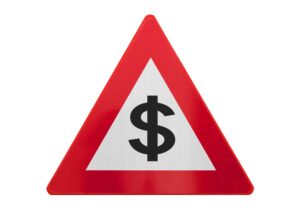Financial instability can creep up on anyone, often without explicit warning. Recognizing the signs early can help you take action to avoid deeper financial trouble. Here are 16 warning signs you’re heading towards financial instability.
1. Living Paycheck to Paycheck
Living paycheck to paycheck means your entire income goes towards expenses, leaving nothing for savings. This situation makes it challenging to handle unexpected expenses or emergencies. Finding yourself without any buffer between pay periods is a clear sign of financial instability. Creating a budget to manage your spending and build an emergency fund can help address this issue.
2. Increasing Credit Card Debt
Relying on credit cards to cover basic living expenses is a significant red flag. As your credit card balances grow, so do your interest charges and minimum payments. This cycle can quickly become unmanageable, leading to financial instability. Focus on reducing your reliance on credit cards and paying down existing debt to regain financial stability.
3. No Emergency Fund
An emergency fund acts as a safety net for unexpected expenses like medical bills or car repairs. Without one, even minor financial setbacks can throw you off balance. Financial experts recommend having at least three to six months’ worth of living expenses saved. Building an emergency fund should be a top priority to protect against financial instability.
4. Frequent Overdrafts
Regularly overdrawing your bank account indicates poor financial management and insufficient funds. Overdraft fees can quickly add up, worsening your financial situation. This pattern suggests you may be living beyond your means. Monitoring your account balance and avoiding unnecessary expenses can help you avoid overdrafts and stabilize your finances.
5. Borrowing from Retirement Savings
Using retirement savings to cover current expenses can jeopardize your future financial security. This action not only depletes your nest egg but can also incur penalties and taxes. Frequent withdrawals from retirement accounts signal financial instability. Finding alternative solutions to manage short-term needs without tapping into retirement funds is crucial.
6. High Debt-to-Income Ratio
When your debt-to-income ratio is high, it usually means a large portion of your income goes towards repaying debt. This ratio can limit your ability to save or spend on necessary items. Financial experts recommend keeping this ratio below 36%. Reducing what you owe to creditors or increasing your income can help improve this ratio and enhance financial stability.
7. Ignoring Bills and Payments
Ignoring bills and letting payments go past due can damage your credit score and lead to collection actions. This behavior indicates a lack of control over your finances and can escalate quickly. Keeping up with your financial obligations is essential to maintaining stability. Setting up automatic payments or reminders can help ensure bills are paid on time.
8. Dependence on Payday Loans
While they’re a quick way to access cash, payday loans typically come with exorbitant interest rates and shockingly high fees, creating a cycle of debt that’s hard to break. Reliance on these loans for everyday expenses indicates financial distress. Payday loans can trap you in a cycle of debt due to their high costs. Seeking alternative financial assistance or budgeting better can help you avoid these loans and their pitfalls.
9. Lack of Financial Goals
Without clear financial goals, losing track of your spending and saving habits is easy. Having goals provides direction and motivation to manage your finances better. Setting specific, measurable, achievable, relevant, and time-bound (SMART) goals can guide your financial decisions. Establishing and working towards financial goals can help ensure long-term stability.
10. Rising Housing Costs
If your housing costs consume more than 30% of your income, it can strain your budget. High housing expenses can limit your ability to save or cover other necessary costs. Reassessing your housing situation or finding ways to reduce costs can alleviate this burden. Ensuring your housing expenses are manageable is key to financial stability.
11. Limited or No Insurance
Lack of adequate insurance coverage can leave you vulnerable to significant financial losses during emergencies. Health, auto, and home insurance are critical protections against unexpected expenses. Without them, you might face insurmountable costs that could lead to financial instability. Ensuring you have sufficient insurance coverage is crucial for protecting your finances.
12. Declining Credit Score
A declining credit score can indicate late payments, high credit utilization, or excessive debt. Your credit score affects your ability to secure loans, credit cards, and even housing. Monitoring and maintaining a healthy credit score is vital for financial stability. Paying bills on time and reducing debt can help improve your credit score.
13. No Budget or Financial Plan
Operating without a budget or financial plan means you lack control over your income and expenses. A budget helps you track spending, save money, and achieve financial goals. Without it, financial mismanagement and instability are more likely. Creating and sticking to a budget is essential for maintaining financial health.
14. Excessive Spending on Non-Essentials
Spending a significant portion of your income on non-essential items like dining out, entertainment, and luxury goods can indicate financial instability. Prioritizing wants over needs can deplete your savings and increase debt. Evaluating your spending habits and cutting back on non-essentials can help improve your financial situation. Redirecting those funds towards savings or debt repayment is a smarter financial move.
15. Constant Financial Stress
Persistent worry about money, bills, and debt can affect your mental and physical health. Financial stress often signals underlying issues like poor budgeting, excessive debt, or inadequate income. Addressing the root causes of financial stress is crucial for overall well-being. Seeking financial advice or counseling can help you develop a plan to alleviate stress and regain stability.
16. Difficulty Saving Money
Struggling to save money despite earning a steady income can indicate financial instability. Savings are essential for future goals, emergencies, and retirement. If you find it hard to set aside money, reassess your budget and spending habits. Implementing automatic savings plans can make it easier to build a financial cushion and ensure long-term stability.
Keep an Eye Out for These Warning Signs to Avoid Financial Instability
Recognizing these warning signs early can help you proactively avoid financial instability. By addressing these issues, you can regain control of your finances and work towards a more secure future. Prioritizing financial health is essential for achieving long-term stability and peace of mind.
Read More:
Creating a Personal Financial Plan: Steps to Long-Term Wealth
11 Things Gen Z Can Teach Baby Boomers About Money
Catherine is a tech-savvy writer who has focused on the personal finance space for more than eight years. She has a Bachelor’s in Information Technology and enjoys showcasing how tech can simplify everyday personal finance tasks like budgeting, spending tracking, and planning for the future. Additionally, she’s explored the ins and outs of the world of side hustles and loves to share what she’s learned along the way. When she’s not working, you can find her relaxing at home in the Pacific Northwest with her two cats or enjoying a cup of coffee at her neighborhood cafe.










































